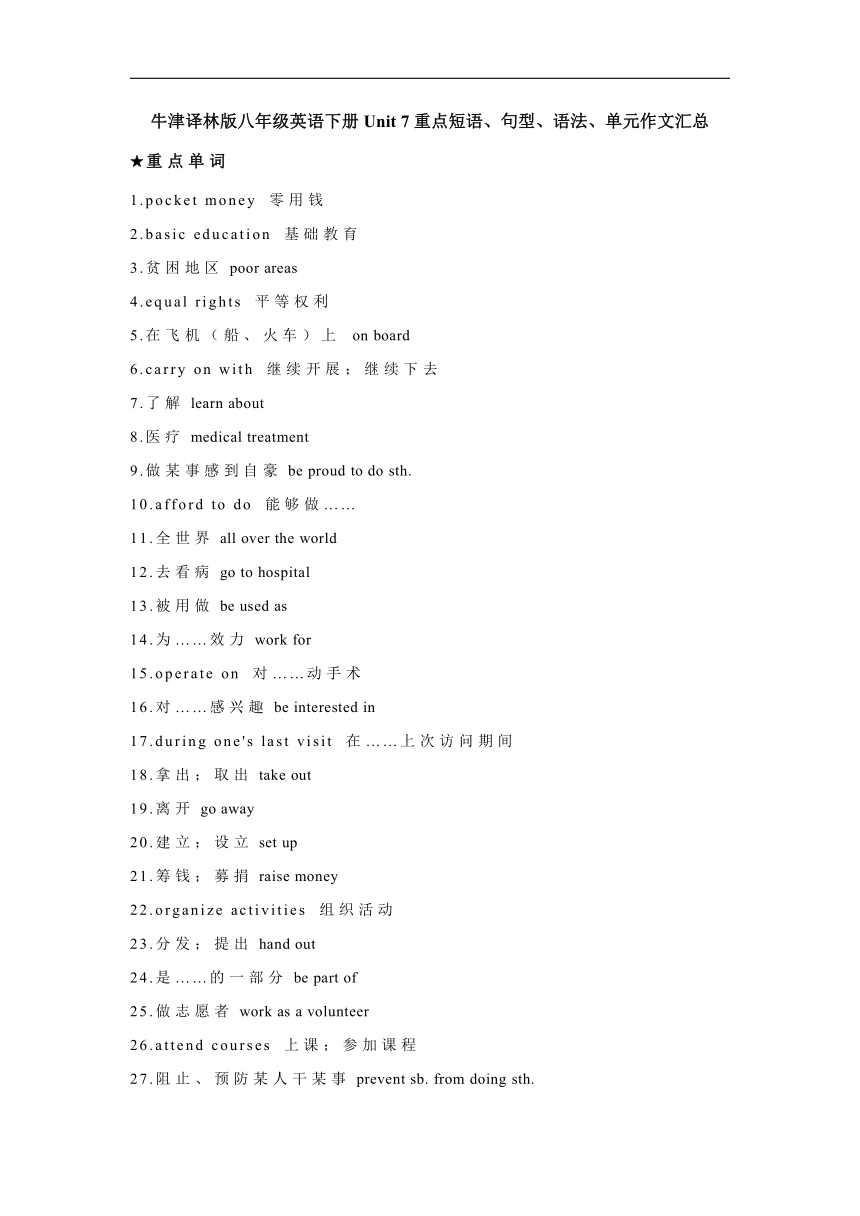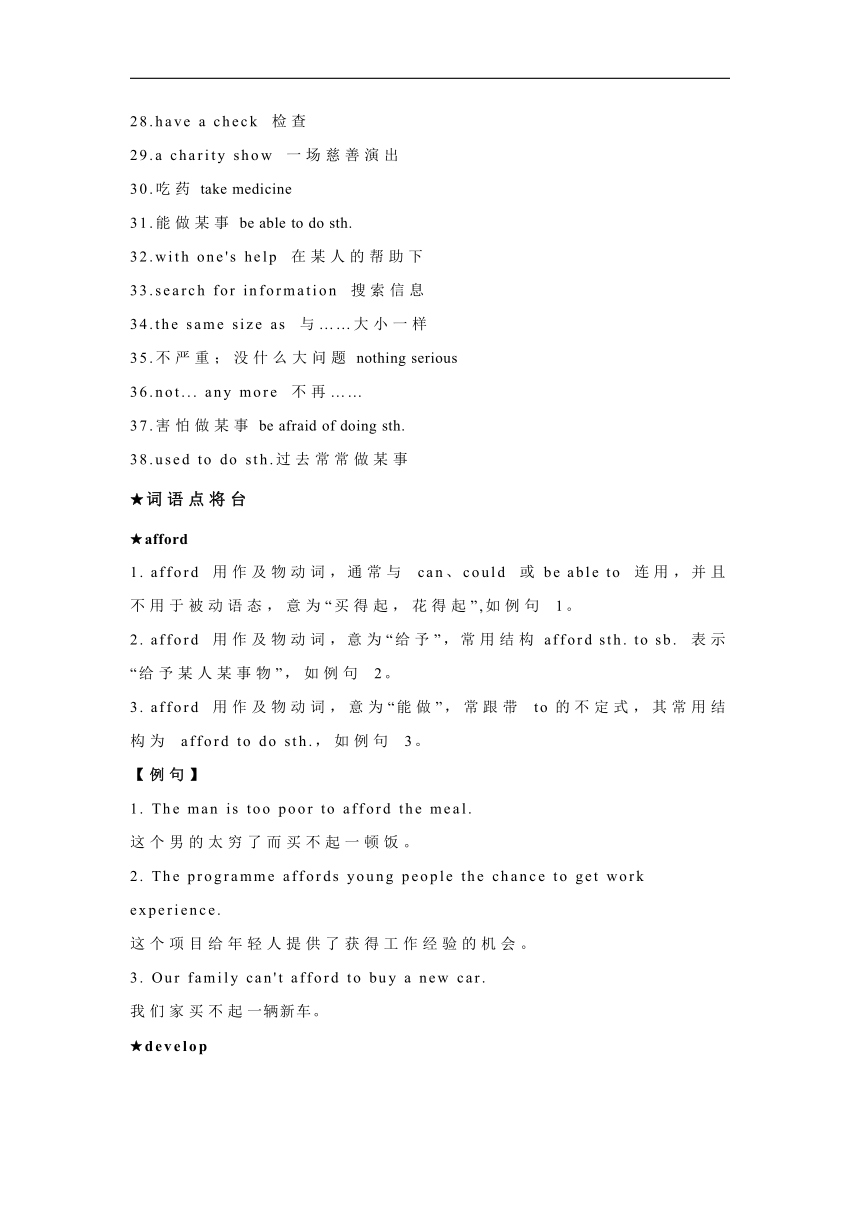Unit 7 International Charities 重点短语、句型、语法、单元作文汇总
文档属性
| 名称 | Unit 7 International Charities 重点短语、句型、语法、单元作文汇总 |  | |
| 格式 | doc | ||
| 文件大小 | 277.0KB | ||
| 资源类型 | 教案 | ||
| 版本资源 | 牛津译林版 | ||
| 科目 | 英语 | ||
| 更新时间 | 2022-04-17 19:37:06 | ||
图片预览


文档简介
牛津译林版八年级英语下册Unit 7重点短语、句型、语法、单元作文汇总
★重点单词
1.pocket money 零用钱
2.basic education 基础教育
3.贫困地区 poor areas
4.equal rights 平等权利
5.在飞机(船、火车)上 on board
6.carry on with 继续开展;继续下去
7.了解 learn about
8.医疗 medical treatment
9.做某事感到自豪 be proud to do sth.
10.afford to do 能够做……
11.全世界 all over the world
12.去看病 go to hospital
13.被用做 be used as
14.为……效力 work for
15.operate on 对……动手术
16.对……感兴趣 be interested in
17.during one's last visit 在……上次访问期间
18.拿出;取出 take out
19.离开 go away
20.建立;设立 set up
21.筹钱;募捐 raise money
22.organize activities 组织活动
23.分发;提出 hand out
24.是……的一部分 be part of
25.做志愿者 work as a volunteer
26.attend courses 上课;参加课程
27.阻止、预防某人干某事 prevent sb. from doing sth.
28.have a check 检查
29.a charity show 一场慈善演出
30.吃药 take medicine
31.能做某事 be able to do sth.
32.with one's help 在某人的帮助下
33.search for information 搜索信息
34.the same size as 与……大小一样
35.不严重;没什么大问题 nothing serious
36.not... any more 不再……
37.害怕做某事 be afraid of doing sth.
38.used to do sth.过去常常做某事
★词语点将台
★afford
1. afford 用作及物动词,通常与 can、could 或be able to 连用,并且不用于被动语态,意为“买得起,花得起”,如例句 1。
2. afford 用作及物动词,意为“给予”,常用结构 afford sth. to sb. 表示“给予某人某事物”,如例句 2。
3. afford 用作及物动词,意为“能做”,常跟带 to的不定式,其常用结构为 afford to do sth.,如例句 3。
【例句】
1. The man is too poor to afford the meal.
这个男的太穷了而买不起一顿饭。
2. The programme affords young people the chance to get work experience.
这个项目给年轻人提供了获得工作经验的机会。
3. Our family can't afford to buy a new car.
我们家买不起一辆新车。
★develop
1. develop 作动词,意为“发展”,常用搭配 develop into 意为“发展成为”,如例句 1。
2. develop 作动词,意为“加强”,如例句 2。
3. develop 作动词,意为“培养;养成”。常用搭配 develop the habit of 表示“培养 / 养成……的习惯”,如例句 3。
【例句】
1. China has developed into a stronger country in the past thirty years.
中国在过去三十年里发展成了一个更加强大的国家。
2. Our friendship has developed over a number of years.
多年来我们的友谊日益深厚。
3. My grandmother has developed the habit of getting up early every day.
我奶奶已经养成了每天都早起的习惯。
★treat
1. treat 作动词,意为“治疗”,be treated for 意为“因为……接受治疗”,如例句 1。
2. treat 作动词,意为“处理”,如例句 2。
3. treat 作动词,意为“对待;把……看成……”,常用句型 treat ... as/like ...,如例句 3。
4. treat 作动词,意为“款待;宴请”,treat sb. to sth. 意为“用……款待某人”,如例句 4。
【例句】
1. The little girl was treated for the eye problem.
这个小女孩因为眼疾接受治疗。
2. We'll continue to treat this problem tomorrow.
我们明天将继续解决这个问题。
3. I treat my pet dog as my best friend.
我把我的宠物狗看成是我最好的朋友。
4. My mother is going to treat our new neighbour to a big meal tonight.
今晚我妈妈打算以一顿大餐款待我们的新邻居。
★语法点击
一般现在时的被动语态 & 一般过去时的被动语态
【点拨】
英语动词有两种语态:主动语态和被动语态。主动语态表示主语是动作的执行者,而被动语态强调主语是动作的承受者。被动语态由“助动词 be + 及物动词的过去分词”构成,具体见下表。注意:一般现在时的被动语态表示现阶段经常性、习惯性的被动动作。
★写作一招鲜
Step 1 写作任务
地震之后,灾区的小朋友们度过了一个使他们终生难忘的“六一”儿童节。一些特别的音乐会为他们举办,在音乐会中他们还和明星们一起演唱。请你根据提示以 “A Special Children's Day”为题,写一篇不少于 80 词的英语短文。
提示:
1. 为他们举办音乐会;
2. 和明星们一起唱歌;
3. 邀请他们和大城市的孩子们一起唱歌、跳舞、玩游戏;
4. 给他们送礼物。
Step 2 抛砖引玉
可能用到的词(组):disaster areas 灾区;unforgettable 难忘的;concert 音乐会
Step 3 思路点拨
Step 4 范文展示
A Special Children's Day
Children's Day is a great day for all the children. Last year, the children from disaster areas had an unforgettable Children's Day!
Some special concerts were held for them. In the concerts, they could sing with the famous singers. Some of them were invited to enjoy the day with other children from big cities. They sang, danced and played games together. Like the other children, they also got many beautiful gifts.
I believe it was the happiest Children's Day they have spent so far! How lucky they were!
★重点单词
1.pocket money 零用钱
2.basic education 基础教育
3.贫困地区 poor areas
4.equal rights 平等权利
5.在飞机(船、火车)上 on board
6.carry on with 继续开展;继续下去
7.了解 learn about
8.医疗 medical treatment
9.做某事感到自豪 be proud to do sth.
10.afford to do 能够做……
11.全世界 all over the world
12.去看病 go to hospital
13.被用做 be used as
14.为……效力 work for
15.operate on 对……动手术
16.对……感兴趣 be interested in
17.during one's last visit 在……上次访问期间
18.拿出;取出 take out
19.离开 go away
20.建立;设立 set up
21.筹钱;募捐 raise money
22.organize activities 组织活动
23.分发;提出 hand out
24.是……的一部分 be part of
25.做志愿者 work as a volunteer
26.attend courses 上课;参加课程
27.阻止、预防某人干某事 prevent sb. from doing sth.
28.have a check 检查
29.a charity show 一场慈善演出
30.吃药 take medicine
31.能做某事 be able to do sth.
32.with one's help 在某人的帮助下
33.search for information 搜索信息
34.the same size as 与……大小一样
35.不严重;没什么大问题 nothing serious
36.not... any more 不再……
37.害怕做某事 be afraid of doing sth.
38.used to do sth.过去常常做某事
★词语点将台
★afford
1. afford 用作及物动词,通常与 can、could 或be able to 连用,并且不用于被动语态,意为“买得起,花得起”,如例句 1。
2. afford 用作及物动词,意为“给予”,常用结构 afford sth. to sb. 表示“给予某人某事物”,如例句 2。
3. afford 用作及物动词,意为“能做”,常跟带 to的不定式,其常用结构为 afford to do sth.,如例句 3。
【例句】
1. The man is too poor to afford the meal.
这个男的太穷了而买不起一顿饭。
2. The programme affords young people the chance to get work experience.
这个项目给年轻人提供了获得工作经验的机会。
3. Our family can't afford to buy a new car.
我们家买不起一辆新车。
★develop
1. develop 作动词,意为“发展”,常用搭配 develop into 意为“发展成为”,如例句 1。
2. develop 作动词,意为“加强”,如例句 2。
3. develop 作动词,意为“培养;养成”。常用搭配 develop the habit of 表示“培养 / 养成……的习惯”,如例句 3。
【例句】
1. China has developed into a stronger country in the past thirty years.
中国在过去三十年里发展成了一个更加强大的国家。
2. Our friendship has developed over a number of years.
多年来我们的友谊日益深厚。
3. My grandmother has developed the habit of getting up early every day.
我奶奶已经养成了每天都早起的习惯。
★treat
1. treat 作动词,意为“治疗”,be treated for 意为“因为……接受治疗”,如例句 1。
2. treat 作动词,意为“处理”,如例句 2。
3. treat 作动词,意为“对待;把……看成……”,常用句型 treat ... as/like ...,如例句 3。
4. treat 作动词,意为“款待;宴请”,treat sb. to sth. 意为“用……款待某人”,如例句 4。
【例句】
1. The little girl was treated for the eye problem.
这个小女孩因为眼疾接受治疗。
2. We'll continue to treat this problem tomorrow.
我们明天将继续解决这个问题。
3. I treat my pet dog as my best friend.
我把我的宠物狗看成是我最好的朋友。
4. My mother is going to treat our new neighbour to a big meal tonight.
今晚我妈妈打算以一顿大餐款待我们的新邻居。
★语法点击
一般现在时的被动语态 & 一般过去时的被动语态
【点拨】
英语动词有两种语态:主动语态和被动语态。主动语态表示主语是动作的执行者,而被动语态强调主语是动作的承受者。被动语态由“助动词 be + 及物动词的过去分词”构成,具体见下表。注意:一般现在时的被动语态表示现阶段经常性、习惯性的被动动作。
★写作一招鲜
Step 1 写作任务
地震之后,灾区的小朋友们度过了一个使他们终生难忘的“六一”儿童节。一些特别的音乐会为他们举办,在音乐会中他们还和明星们一起演唱。请你根据提示以 “A Special Children's Day”为题,写一篇不少于 80 词的英语短文。
提示:
1. 为他们举办音乐会;
2. 和明星们一起唱歌;
3. 邀请他们和大城市的孩子们一起唱歌、跳舞、玩游戏;
4. 给他们送礼物。
Step 2 抛砖引玉
可能用到的词(组):disaster areas 灾区;unforgettable 难忘的;concert 音乐会
Step 3 思路点拨
Step 4 范文展示
A Special Children's Day
Children's Day is a great day for all the children. Last year, the children from disaster areas had an unforgettable Children's Day!
Some special concerts were held for them. In the concerts, they could sing with the famous singers. Some of them were invited to enjoy the day with other children from big cities. They sang, danced and played games together. Like the other children, they also got many beautiful gifts.
I believe it was the happiest Children's Day they have spent so far! How lucky they were!
